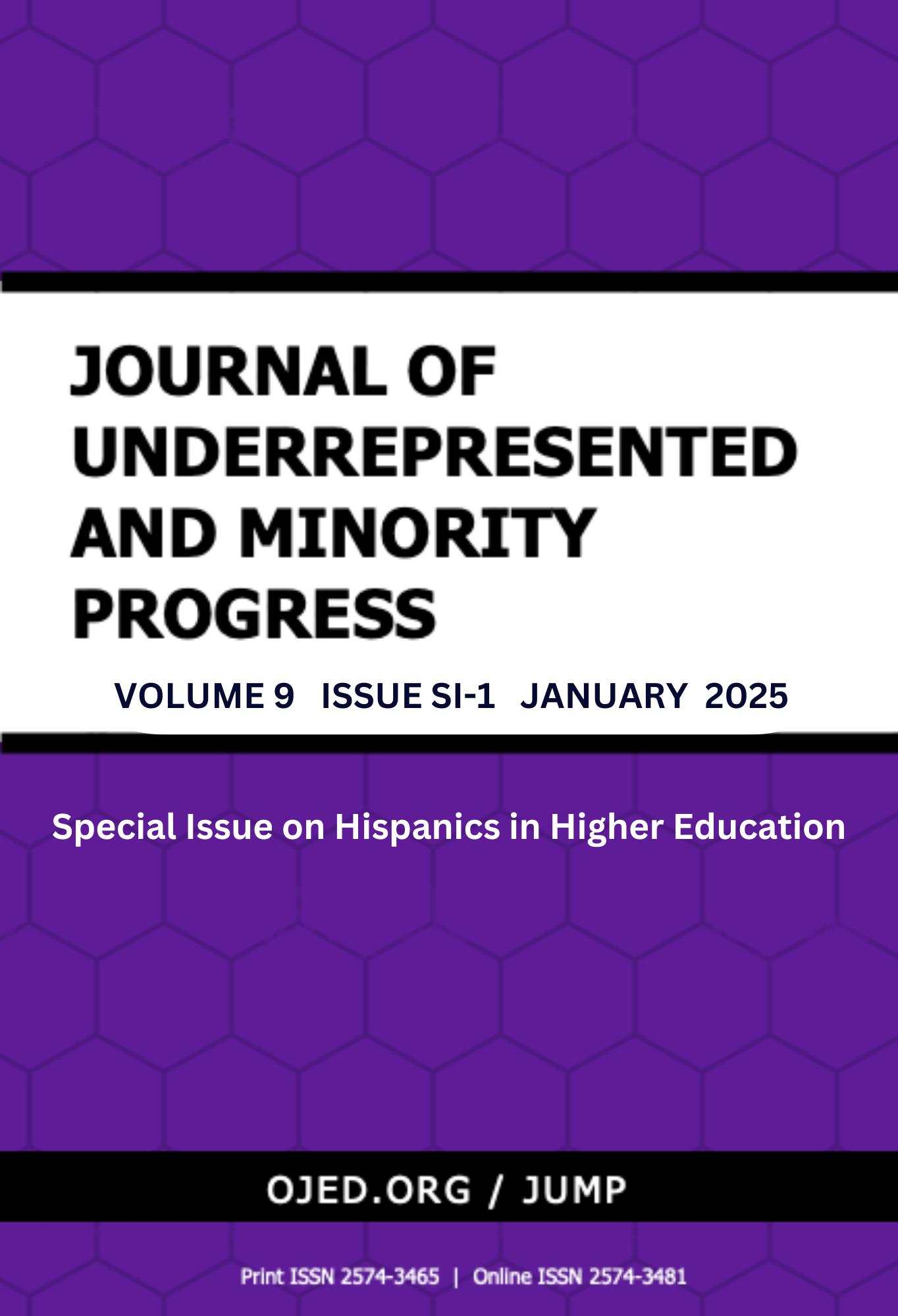From Supremacy to Inclusiveness: A Transformation Model to Guide a Mainly White University to Become a Latine Research Serving Institution
DOI:
https://doi.org/10.32674/01kdt869Keywords:
Curriculum, Decolonization, Hispanic Serving Institutions, Liberation, Social JusticeAbstract
There is an indication that Western, Educated, Industrialized, Rich, and Democratic (WEIRD) concepts dominate the discourse regarding what research and knowledge should be about, not including all that is known about all people. These conceptions about research and knowledge are problematic since they perpetuate Western societies' ideas that undermine diversity, inclusion, and the development of critical thinking within academic spaces. We developed a decolonization model to engage a midsized university in the decolonization of all aspects of academia that include students, curriculum, faculty, administration, and the community. The model uses the work of Enriquez (1994), Martin-Baro and Laenui (2000) as a framework to decolonize academic curriculums—integrating the liberation psychology wheel to move policies and the strategic plan in the journey toward a decolonized Latine Research Serving Institutions.
References
Blume, A. (2020). A New Psychology Based on Community, Equality, and Care of
the Earth: An Indigenous American Perspective. Santa Barbara: Praeger ABC-CLIO, LLC.
Comas-Díaz, L., & Torres Rivera, E. (2020). Liberation psychology: Theory,
Method, Practice, and Social Justice (L. Comas-Díaz & E. Torres Rivera, Eds.). America Psychological Association.
Freire, P. (1996). Pedagogy of the oppressed (Rev. ed.). New York: NY: Penguin
Group.
Garcia, G. A. (2018). Decolonizing Hispanic-serving institutions: A framework for
organizing. Journal of Hispanic Higher Education, 17(2), 132–147.
Greene, P. (2022). Education And The Politicizing Of Everything. Forbes.
Hartmann, W. E., Wendt, D. C., Burrage, R. L., Pomerville, A., & Gone, J. P.
(2019). American Indian historical trauma: Anticolonial prescriptions for healing, resilience, and survivance. American Psychologist, 74(1), 6–19. https://doi.org/10.1037/amp0000326
Laenui, P. (2000). Processes of decolonization. In M. A. Bastiste (Ed.), In
Reclaiming indigenous voice and vision. (pp. 150–160). The University of British Columbia Press.
Lebeloane, L. (2017). Decolonizing the school curriculum for equity and social
justice in South Africa. Koers - Bulletin for Christian Scholarship, 82(3). https://doi.org/10.19108/KOERS.82.3.2333
Lumadi, M. W. (2021). The pursuit of decolonising and transforming curriculum in
higher education. South African Journal of Higher Education, 35(1), 1–3.
Macleoud, C. I., Bhatia, S., & Liu, W. (2020). Feminism and decolonising:
Possibilities and challenges. Feminists and Psychology, 3(3), 287–3005. https://doi.org/10.1177/0959353520932810
Martin Baró, I. (1998). Psicología de la liberación. Editorial Trotta.
Martín-Baró, I. (1986). Hacia una psicología de la liberación. Boletin de Psiclogia,
(22), 1–11.
Moane, G. (2014). Liberation psychology, feminism, and social justice psychology.
In J. Diaz, Z. Franco, & K. Nastasi, Bonnie (Eds.), The Handbook of Social Justice and Psychology: Fundamental issues and special populations (Vol. 1, pp. 115–132). Santa Barbara: Praeger.
Montero, M. (2009). Methods for liberation: Critical consciousness in action. In M.
Montero & C. Sonn, Christopher (Eds.), Psychology of liberation: Theory and applications (pp. 73–91). New York: NY: Springer.
Moratilla, N. C. A. (2019). Revisiting Paulo: Critical Pedagogy and Testimonial
Narratives as Liberative Spaces in the Philippines' K-12 Curriculum. Journal for Critical Education Policy Studies (JCEPS), 17(2).
Tate, K. A., Torres Rivera, E., Brown, E., & Skaistis, L. (2013). Foundations for
liberation: Social justice, liberation psychology, and counseling. Interamerican Journal of Psychology, 47(1), 373-382.
Wilson, S. (1997). The indigenous people of the Caribbean. (S. M. Wilson, Ed.).
Gainesville, FL: University Press of Florida.


